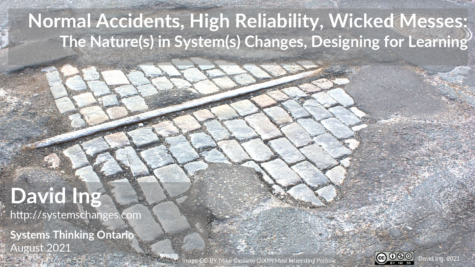Choosing topics for a Systems Thinking Ontario session, it seems as though the term “Normal Accidents” was not one familiar to many, particularly those who were not old enough to recall popularization coinciding with the 1979 movie The China Syndrome. The interest then on High Reliability Organizations would also be news to most of our usual attendees. Thus, a session based on readings was announced ….
Have we learned from brushes with disaster, or have we become complacent about complexities in everyday life?
This video has been archived on the Internet Archive .
| Video | H.264 MP4 |
| August 9 (1h32m) |
[ (FHD 578kbps 456MB) [on the Internet Archive] |
Audio downloadable onto mobile devices was transcoded from the video into MP3.
| Audio | |
| August 9 (1h32m) |
[20210809_ST-ON_Ing NormalAccidentsHighReliabilityWickedMesses.mp3] (90MB) |
On March 28, 1979, an accident with a nuclear reactor occurred at Three Mile Island, Pennsylvania. Twelve days earlier, an Academy Awards winning film The China Syndrome had opened with a story fictionalized from a 1975 fire at a nuclear plant in Brown’s Ferry, Alabama, raising public awareness of an issue. For a Presidential Commission on the Accident at Three Mile Island, sociologist Charles Perrow contributed organizational analysis report. On a sabbatical to the Center for Advanced Study in the Behavioral Sciences in 1981-1982, that report expanded to include other high-risk systems, becoming the Normal Accidents book, published in 1984.
In the 1990s, a group at Berkeley initiated by Todd LaPorte noticed some high-hazard organizations who able to consistently manage risks to be failure-free. The organizations included the (i) Air Traffic Control System (FAA); (ii) Electric Operations and Power Generations Departments (Pacific Gas and Electric); and (ii) peacetime flight operations in the U.S. Navy. These cases were studies as High Reliability Organizations.
Many of the researchers continue to meet in the Center for Catastrophic Risk Management (CCRM). In the study of complexity, Ian Mitroff has labelled some situations as wicked messes.
This Systems Thinking Ontario session was led as a discussion group by David Ing. A short introduction was provided. Participants were then encouraged to contribute their impressions of the pre-readings, relate their experiences and/or ask questions.
Suggested pre-readings
Articles in reflection:
- Le Coze, Jean-Christophe Le. 2015. “1984–2014. Normal Accidents. Was Charles Perrow Right for the Wrong Reasons?” Journal of Contingencies and Crisis Management 23 (4): 275–86. https://doi.org/10.1111/1468-5973.12090. [alternative search on Google Scholar]
- Bourrier, Mathilde. 2011. “The Legacy of the High Reliability Organization Project.” Journal of Contingencies and Crisis Management 19 (1): 9–13. https://doi.org/10.1111/j.1468-5973.2010.00628.x. [alternative search on Google Scholar]
- Mitroff, Ian I., and Ralph H. Kilmann. 2021. “Wicked Messes: The Ultimate Challenge to Reality.” In The Psychodynamics of Enlightened Leadership: Coping with Chaos, 21–24. Management, Change, Strategy and Positive Leadership. Cham: Springer International Publishing. https://doi.org/10.1007/978-3-030-71764-3_3. (open access as Chapter 3)
- Mitroff, Ian I., and Ralph H. Kilmann. 2021. “Heuristics and Meta-Heuristics for Coping with Messes.” In The Psychodynamics of Enlightened Leadership: Coping with Chaos, 49–58. Management, Change, Strategy and Positive Leadership. Cham: Springer International Publishing. https://doi.org/10.1007/978-3-030-71764-3_8. (open access as Chapter 8)
Original works:
- Perrow, Charles. 1984. Normal Accidents: Living with high risk technologies. New York: Basic Books. [preview of updated 2011 edition on Google Books]
- LaPorte, Todd R., and Paula M. Consolini. 1991. “Working in Practice But Not in Theory: Theoretical Challenges of ‘High-Reliability Organizations.’” Journal of Public Administration Research and Theory 1 (1): 19–48. https://doi.org/10.1093/oxfordjournals.jpart.a037070. [alternate search on Google Scholar]
- Rochlin, Gene I. 1996. “Reliable Organizations: Present Research and Future Directions.” Journal of Contingencies and Crisis Management 4 (2): 55–59. https://doi.org/10.1111/j.1468-5973.1996.tb00077.x. [alternate search on Google Scholar]
- LaPorte, Todd R. 1996. “High Reliability Organizations: Unlikely, Demanding and At Risk.” Journal of Contingencies and Crisis Management 4 (2): 60–71. https://doi.org/10.1111/j.1468-5973.1996.tb00078.x. [alternate search on Google Scholar]



